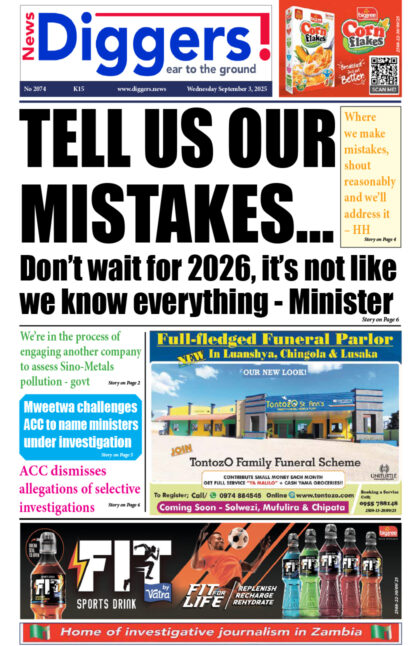11 UNIP members have sued the party president Tilyenji Kaunda and other leaders in the Lusaka High Court for allegedly holding on to their positions as Members of Central Committee (MCCs) illegally, claiming that their mandate expired in 2005.
The plaintiffs are seeking an injuction to restrain Kaunda and others from performing functions of MCCs, an order for an account of all party assets sold from 2000 to date, among other claims.
Fackson Njovu has sued Kaunda, UNIP vice president Njekwa Anamela, secretary general of the party Alfred Banda and Administrative secretary Welfare Mfune, on behalf of 10 other party members.
In a statement of claim filed in the Lusaka High Court, Tuesday, Njovu explained that the plaintiffs were members and leaders at various levels of UNIP, a political party whose main objective was to form government in furtherance of national values.
He added that the defendants were also members of UNIP who were elected as Members of Central Committee in 2000.
“Kaunda was elected president in 2001, while Anamela, Banda and Mfune were handpicked by Kaunda as vice president, secretary general and administrative secretary respectively,” read the statement of claim.
Njovu stated that by virtue of their constitution, every five years the party was obliged to hold a congress which was the supreme decision making body, to elect new members of the central committee (MCCs).
He stated that the party held its last congress in 2000 where Kaunda was elected as secretary general and a national council in 2001 where Kaunda was elected president during a by-election.
Njovu claimed that the mandate of Kaunda or any member of the central committee thus ended in 2005 and ever since then, no congress had been held to elect a new leadership of MCCs.
“Based on the above the defendants have held their positions as MCCs illegally as their mandate expired in 2005 and they have not held congress to renew their mandate, or to have new MCCs elected,” read the statement of claim.
He stated that currently, the four defendants had been holding themselves out as MCCs serving as president, vice president, secretary general, administrative secretary respectively, without the backing of the law.
Njovu added that the defendants had also made decisions that required two/three majority threashhold, including sale of party assets and expenditure.
He further stated that the sale of major party assets by the defendants had no blessings of any congress or the party constitution and thus in breach thereof; the defendants have been striping the party assets with impunity.
Njovu stated that the general membership of the party had been deliberately sidelined and excluded from the party activities by not holding congress in 19 years and systematically, by selling assets without consultations and approval of the congress.
He explained that the Registrar of Societies had now recognised an interim leadership of the party which should work hand in hand with the defendants as outgoing leaders to hold the congress by December this year.
He, however, stated that the defendants were unwilling to follow the directive of the Registrar of Societies, adding that several meetings with the defendants to hold the congress had proved futile.
“The defendants now want to hold a smoke screen congress to legitimise their illegal hold on power and escape liability of abuse of office and sale of party assets,” read the statement of claim.
Njovu stated that the need to hold a properly constituted party congress was a matter of urgency and it was not negotiable.
He claimed that by not holding a congress for 19 years, the defendants had breached the party constitution and had caused damage to the party through loss of membership and making the once vibrant party irrelevant to the Zambian political and democratic dispensation.
The plaintiffs are seeking an order that outgoing MCCs and the recognised interim MCCs follow the Registrar of Societies administrative directive to jointly organise and hold a congress by forming one working group.
They also want an injunction to restrain the defendants from performing any functions of UNIP MCCs, serve for those to prepare for congress in consultation with the interim central committee recognised by the Registrar of Societies.
The plaintiffs also want the defendants to be ordered to produce a full UNIP inventory of assets and funds within and outside the country, an order for an account of all the party assets sold from 2000 to date, costs and any other relief the court may deem fit.
























